Located about 12 miles from the Berbice Bridge and 14 miles from New Amsterdam, the village of Belvedere on the Corentyne boasts about 25,000 residents. Bordered by Nigg and Hampshire, it recently was the beneficiary of a modern private hospital, the Anamaya Memorial Hospital. Another clinic operated by a private physician and surgeon is situated not far away.
Residents have easy access to products from the two meat centres: D. Arjune & Sons and Zeareat Ali’s Halaal. In addition there is a supermarket, grocery stores, a chips factory, DVD shop, a Guyoil gas station and a bridal shop located in the village.
Some residents, mostly men, would also hang out at their favourite liquor restaurants, but there are also those who spend time worshipping at the mosque, mandir and church.
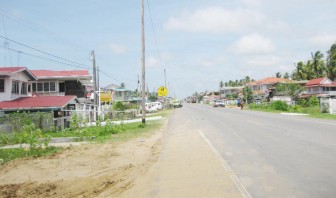
Many residents are employed at the Albion Sugar Estate primarily as cane-harvesters, and with the out-of-crop season still on they have to seek other means of earning an income. Mostly this involves livestock rearing, fishing and gardening.
Some of the residents have been offered other jobs at the estate during this period to weed or “chop and plant.” One man, Seenarine Mangar, told the Sunday Stabroek that he was not doing any work at the moment and was relaxing until the crop season resumed. He said he was “eating out of my savings for now.”
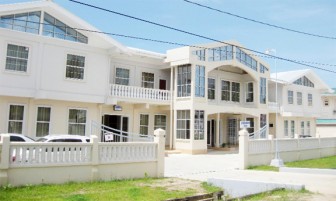
During the out-of-crop season he would normally be offered a job to weed and he did not mind that at all. However, he was not accustomed to the “chop and plant” system, and prefers to wait until the crop starts again to work. Another harvester, Avemanen Permaul, said he would normally rear livestock and at the moment he is depending on that to run the home. His wife supplements their income as a domestic worker.
A sugar worker’s job starts from around 3 am, while their wives would also get up early to prepare their meals. The workers then join the trucks to take them into the canefields in the backlands.
State of village
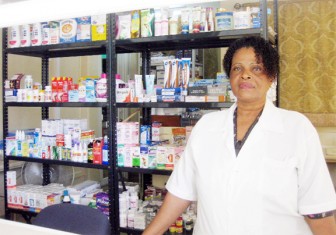
Residents love living in the village but were concerned about the deplorable condition of a section of the access road to the Belvedere Primary School. During the rainy season the street which also provides access to the cemetery and the Belvedere Industrial Site located in the nearby Hampshire Village is almost impassable.
They were pleased that some of the other streets had been fixed, although they did not think that they had been done to the required standard they should have been. They said too that the drains are clogged with thick bushes and when it rains sections of the area are flooded.
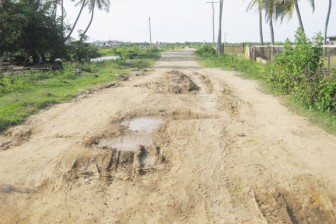
The residents said too that the Belvedere Primary School is in a terrible condition and badly needs fixing. They noted as well that the vendors have no proper place to sell and have been operating from a classroom.
Another concern of businesspersons is that the authorities pulled down the small signboards in the village but left those belonging to the larger businesses.
NDC Chairman
In an interview with the Sunday Stabroek, Chairman of the Neighbourhood Democratic Council (NDC), Sunny Ramlall, 74, claimed that the “weeds have grown because of the heavy rains.”
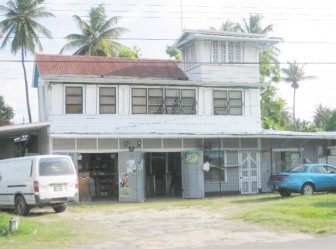
He said too that the drainage and irrigation workforce has been reduced because the workers have found other jobs. “The area is big and by the time they reach one end the other gets clogged up.”
Ramlall also pointed out that residents contribute to the clogging because they dump garbage into the trenches. The NDC did not have “enough money or we would have employed private people to clean the drains.” He added that if they had “full co-operation from the residents the environment would be better. At least they could clean in front of their homes.”
The chairman referred to the fact that the village had once had the biggest squatting area in the region, but it had now been developed into a housing scheme. It has benefited from roads, water and electricity, he said.
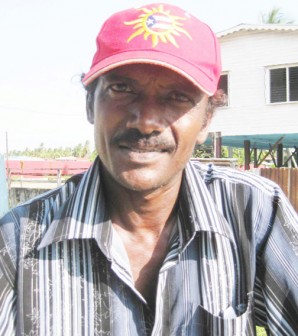
He went on to say that when the Ministry of Housing hands over the scheme to the Local Government Ministry it would get the necessary appraisals for the residents to pay taxes, and “the NDC still has to serve them.”
Ramlall also told this publication that heavy-duty trucks would damage the streets. He said the residents would ask for bars to be erected to prevent the trucks from entering but some persons would break them up. In addition, he went on, cattle would come from the neighbouring villages and damage the drains and parapets.
As far as the school access road was concerned, he told this newspaper it would be rehabilitated up to the industrial site. He added that “the NDC had done some work to the entrance of the school and when necessary we would weed around the building.”
He also mentioned that the regional administration “is giving a lot of assistance to the NDC and the regional chairman, [Zulfikar Mustapha] is making representations for us to have the funding from central government.”
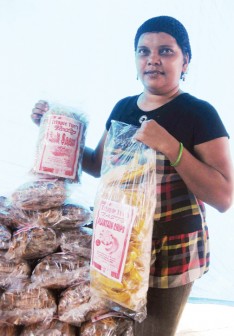
Residents had said that the chairman has been involved in selling dirt from the
village for $2,500 per trailer-load. However, he responded that it was “unused dirt” that other persons would take to fill up low areas. He made it clear that the dirt was not being sold but the residents had to pay the cost of transporting it.
Youths
A resident observed that some of the youths who are early school-leavers are “wasting a lot of time.” She said they are also out of work and should “learn a skill so that they can earn a living…” She noted too that many of the parents lack education and as such do not know “how to bring up children.”
The woman pointed out that some youths turn to drugs and alcohol and get into other negative activities from a young age. She told this newspaper that the Cheddi Jagan Multipurpose Centre was established right next to the street in the neighbouring village of Hampshire but is not being used effectively. While the gate is closed most of the time somehow the residents manage to get their animals in and use it as pasture.
They have been waiting patiently for the Belvedere Industrial Site to be kick-started so that there would be more employment opportunities for the youths.
Anamaya Memorial Hospital
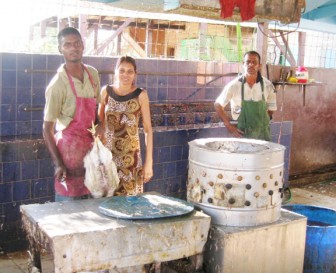
The latest enterprise to enhance services in the community is the Anamaya Memorial Hospital that covers a couple of lots on the roadside. The modern private institution which is expected to provide the services offered in Georgetown commenced an outpatient clinic in January.
Dr Ryan Anamaya told the Sunday Stabroek
that so far they are providing x-rays, laboratory tests, pap-smears and a pharmacy. There are also a family planning consultations available, and a weekly gynaecology clinic on Wednesday afternoons.
Dr Anamaya said he is planning to employ a permanent radiologist and gynaecologist and a temporary orthopaedic surgeon and other specialists.
He said that in terms of employment, he currently has four part-time professional staff along with 12 full-time workers.
He is gearing for the inpatient, maternity services and the theatre for minor surgery to be ready within one month when the facility would be officially launched.
The hospital is equipped with two operating theatres, an Intensive Care Unit, a physiotherapy department and a mortuary. It has two open wards for males and females, a paediatric ward, a maternity wing and private rooms.
In the near future, Dr Anamaya said, there would be a CT-scan machine. According to him, the hospital creates an atmosphere for professionals to offer services for which many persons would normally have to travel to Georgetown. He noted that even though there is the Berbice Bridge, the inconvenience of having to stay out of the district with relatives who are hospitalized can be frustrating.
He is aware that persons would be concerned about the cost of the services and promised to make them affordable. He said so far there have been good responses from the public.
The hospital, he said, which was named after his late father, Joseph Anamaya “came into being because there was a need for it. Berbicians were asking for it for a long time.”
Dr Anamaya, who attended the JC Chandisingh Secondary School on the Corentyne studied at the University of Guyana. He then worked at the Georgetown Public Hospital for three years before moving to the New Amsterdam Hospital for a two-year stint.
Residents told this newspaper they were happy to have the hospital and saw it as a positive development in their village.
Kadir’s Fashion
Close to the hospital is Kadir’s Fashion which is owned by Shafiran Habil and her husband, Nezam Kadir. They stock Islamic clothing and accessories as well as a wide range of fabrics for ladies and gents.
Habil who is a seamstress said customers who purchase fabric have the option of getting their clothing custom-made. She would take care of the ladies clothing while her husband who is a
tailor would sew the pants.
Habil was born in Belvedere and lived in the squatting area at the back of the village. Over 20 years ago she and her husband bought the place on the roadside and relocated there. She said they are just “earning enough to survive” but enjoy what they do. They have been living alone since their three children got married and are also involved in Islamic activities.
‘Triple Tues’
Tucked away at the back of the village is the ‘Triple Tues Tasty Snacks’ factory that belongs to Bramo Sewnarine and Seetana Persaud. With a few staff on board, the factory produces and packages plantain, cassava and sweet potato chips and salt-seaw. Thirty-five packs of
the snacks are placed in a sack which is sold at a wholesale price.
The couple also makes fried nuts and channa, tamarind balls and fudge and supplies their products to shops across the Corentyne, West Berbice and on the East Coast of Demerara.
Sewnarine said he is hoping to move into a new place which is more convenient and by then he would be able to supply shops as far away as Parika.
Persaud said the plantains and tubers are bought from farmers in the area and most of the other ingredients are local as well.
She is also involved in business as a caterer, making mostly appetizers, and would decorate cakes for weddings and other occasions with her locally-made ‘fruits.’ In addition to that she would also dress brides, decorate halls for functions and do floral arrangements.
Persaud who learnt to cook since she was 11 years old said she developed most of her talents on her own but also attended the Carnegie School of Home Economics during the school holidays.
She said came from a family that was in the business of food as her grandparents operated a canteen. Her father also made alcoholic beverages while living at Fyrish.




